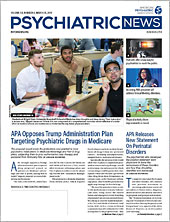In my last column, I shared some of the important initiatives in which I have been involved over the past year as part of the strong advocacy push under way in psychiatry. In this column, I’d like to talk about how we get the job done. In addition to joining other leaders of the Group of Six—a coalition representing more than 560,000 physicians and medical students—to visit legislators last month to discuss health care reform issues, I had the privilege to represent APA at a recent hearing about the negative impact of the administration’s policy regarding separating children from their families at the border (see next issue of Psychiatric News). In addition, I recently traveled to Chicago for the annual meeting of the Illinois Psychiatric Society and learned of the challenges its members are facing with regard to safe-prescribing legislation being re-introduced in the state legislature this session. I also hear regularly about the work of members in other states to prevent passage of legislation allowing unsafe prescribing practices, for example, in Hawaii, Connecticut, Florida, Montana, and elsewhere.
For us to work for the passage or defeat of legislation or engage in other kinds of advocacy work, it takes a team of highly knowledgeable and dedicated professionals to support us, and we are very fortunate to have such a team at APA in the Division of Government Relations (DGR). Unless you are serving nationally on an APA component, involved in APAPAC, or active at the district branch/state association level, you may not be aware of the wide range of work in which the DGR staff are involved on our behalf. I have had the opportunity over the past year to work very closely with the chief of DGR, Craig Obey, and his team in Washington, D.C., and regional directors throughout the country. On a daily basis, they are identifying issues in which psychiatry needs to have a voice and connecting with legislators and their staffs to educate them about mental illness, the need for increased access to safe and effective treatment, professional issues that impact the practice of psychiatry, and much more. They also provide staff support to the Council on Government Relations (CAGR), the APA component charged with helping to prioritize our legislative agenda and promoting advocacy to achieve our goals.
DGR will have a booth at APA’s 2019 Annual Meeting in May. If you are attending the meeting, introduce yourself to the staff and find out the many ways you can become involved in advocacy at the local, state, or national level. If you haven’t already, check out our
advocacy website. Plan to attend national and state advocacy meetings. As I noted in my last column, one of the most powerful advocacy tools we have is you and the stories you can share with legislators about your patients’ struggles. They help move the conversation from a general, impersonal discussion of policies and legislation to poignant descriptions in real-life terms of people who are suffering because of the deplorable inadequacies of the current health and mental health system.
We will never stop fighting for what we need, and the DGR staff will not stop working on our behalf. I encourage you to devote even a small of amount of your time to becoming involved in APA’s advocacy efforts—you might just be surprised
how powerful your voice can be. As Mahatma Gandhi said, “You must be the change you wish to see in the world.” And we’ll help you do it. ■

